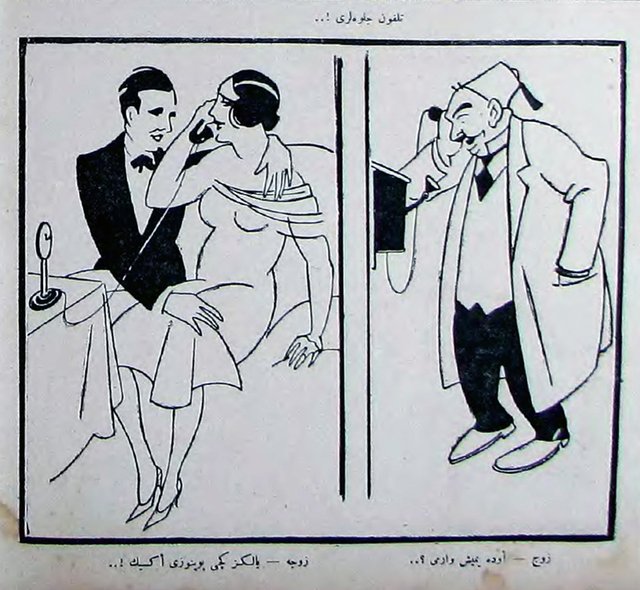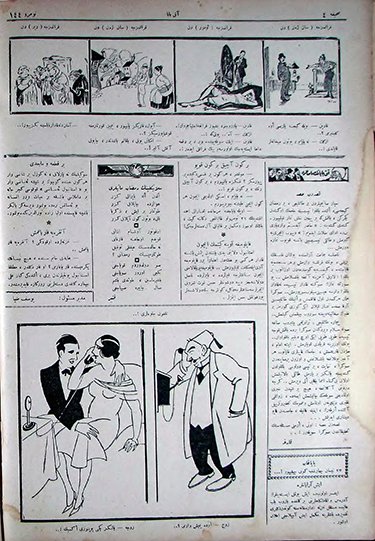79. Today in 1920s Turkey: 21 April 1924 (Frisky Fact: Double Entendres Are Funnier Over the Phone)

(Cartoon, Akbaba or “Vulture/White-Bearded Old Man,” 21 April 1924, no. 144, page 4.)
Comments:
Modern life is propelled by ever-evolving technologies aimed at making daily existence easier, more convenient, efficient, and predictable. In the 1920s one such technological wonder was the telephone. The first public telephone lines had been in existence in Istanbul since 1911, so that by the 20s the gadget was wide-spread enough to be in the houses of the well-to-do, affluent segments of society. Of course, while communication technologies such as the telephone promise endless benefits, the people who use them may end up using them for less-than-honest purposes.
The potential for the telephone was quickly recognized in recreational entertainment outlets such as film, literature, theater, and cartoons as a set-up for situational humor. Satirists such as cartoonists, enjoyed pursuing the many discrepancies between the wonders of technology and the silly, mundane, or dishonest ways they are put to use by humans. In the case of the present cartoon, the telephone is at the center of the trickery spun by a woman about to cheat on her husband. The cartoon features (what would now be considered a classic, standard composition for phone-calls) a vertically split screen with each participant on the phone call occupying one frame. On the right is the husband calling his wife at home. On the left is the wife at home with a younger, fitter, more handsome man; she is answering the phone while her “boyfriend” has his hands all over her. Beneath is frame is the dialogue assigned to the person in the frame:
English
(Above)
Telephone Flirtations!..
(Below)
Husband: Are their any snacks at home?
Wife: We’re missing only dried carob pods!
Türkçe
(Üstte)
Telefon Cilveleri!..
(Altta)
Zevc: Evde yemiş var mı?..
Zevce: Yalnız keçiboynuzu eksik!..
(Comments continued)
Because it transmits sound and not image, the telephone provides only a snippet of the woman’s current situation to her husband on the line. As readers we are afforded the privileged view of both parties and thus we are invited to be “in on the joke” in a way that the poor husband cannot be. Through the imagery of the cartoon we know that the woman is at home with another man which is precisely what she insinuates to her husband through her words featured in the text below. The cartoon’s text is charged with double entendras and sexual innuendo that play into the “cheating” scenario. Here is how:
The husband, thinking ahead to returning home (possibly after work), calls to see if there is anything he needs to pick up on the way home. Specifically, he asks if there are yemiş, a Turkish word that refers broadly to dried nuts and fruits and that literally means “edibles.” To simplify it in the translation, I used “snacks.” Like yemiş, both “snacks” and “edibles” could be read as sexual innuendo, especially when paired with the image on the left. And indeed, the wife replies that there are edibles (hence the fact that she looks like she is about to be devoured by a hungry young man) and that all that is missing are “dried carob pods.” Like the “snacks” a bit of the original meaning is lost in translation. Allow me to recover it: the word for carob pods (which do qualify as legitimate snacks in Turkey) in Turkish is keçiboynuzu which literally means “goat’s horns.” Getting the “horn treatment” or getting crowned with horns in any sense of the idiom means "to be cheated on" in Turkish. Thus, the wife is admitting through a double entendre that she is cheating on her husband. The symbolism of the “goat horns” or rather “carob pods” does not end with that. There are more layers of meaning to peel back that relate to the veiled sexual references in the cartoon. For instance, carob pods look awfully phallic in the first place (thus resembling a goat’s horns). Moreover, in Turkey the carob fruit is believed to be a natural aphrodisiac for male virility. By saying that there are no carobs at home, the wife is insinuating that if the husband wants to “perform” certain duties, he would need some “help” in the form of carobs first. After all, look at his competition...

(Entire page, Akbaba or “Vulture/White-Bearded Old Man,” 21 April 1924, no. 144, page 4.)